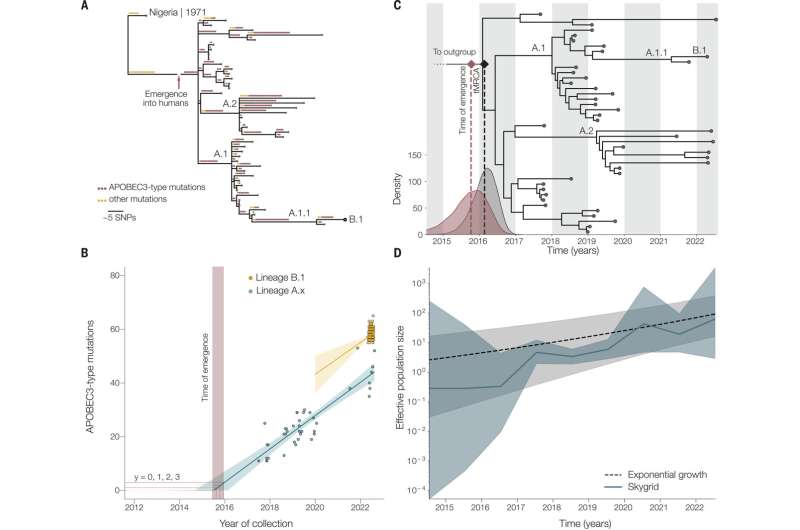November 3, 2023 report
This article has been reviewed according to Science X's editorial process and policies. Editors have highlighted the following attributes while ensuring the content's credibility:
fact-checked
peer-reviewed publication
trusted source
proofread
Researchers find evidence of mpox circulating in humans since 2016

A large international team of medical researchers and epidemiologists has found evidence that monkeypox (mpox) has been circulating in humans since 2016. In their study, reported in the journal Science, the group used Bayesian evolutionary analysis of the mpox virus to show that its genomic history includes years of change due to human infections.
Mpox was first identified in the 1950s after an illness struck a group of research monkeys in Denmark. Twenty years later, the first case was detected in a human in Africa. Over the following decades, several cases of the disease were seen in humans and all were attributed to the virus jumping from other mammals.
Then, in 2017, an outbreak occurred in Nigeria and by 2022, it had spread across the globe, demonstrating that the virus had evolved to jump from human to human. In this new effort, the research team took a closer look at the genome of the virus behind mpox to learn more about its evolutionary history, particularly how it relates to human infections.
The researchers sequenced the genome of the mpox virus to learn more about its evolutionary history. They found that the clade IIb was the one that had spread around the world. They also noted that it looked different from other strains that had been seen before in Africa.
They found a mutation that had led to the production of an enzyme called APOBEC3, which was found to cause further mutations that alter genome base pairs. It was also found to have come about due to infections in humans. That allowed the team to trace the evolutionary history of the virus as it infected humans—they found such mutations going back to approximately 2016, which strongly suggests that the virus has been transmittable between humans since that year.
The research team concludes that there is a strong likelihood of multiple cases of small mpox outbreaks that have not been recognized, allowing the virus to spread under the radar. They further suggest stronger surveillance methods be established because the virus is still mutating rapidly and could become deadlier.
More information: Áine O'Toole et al, APOBEC3 deaminase editing in mpox virus as evidence for sustained human transmission since at least 2016, Science (2023). DOI: 10.1126/science.adg8116
© 2023 Science X Network



















